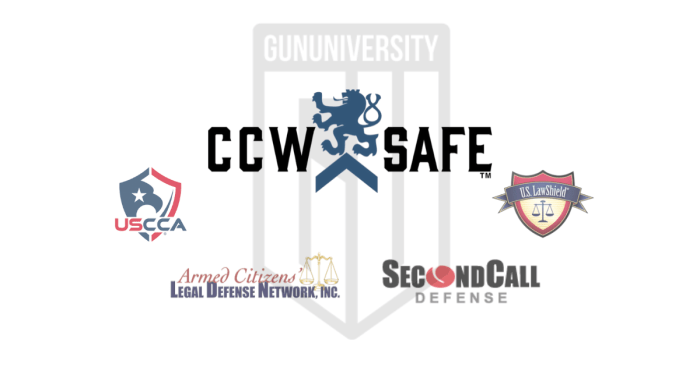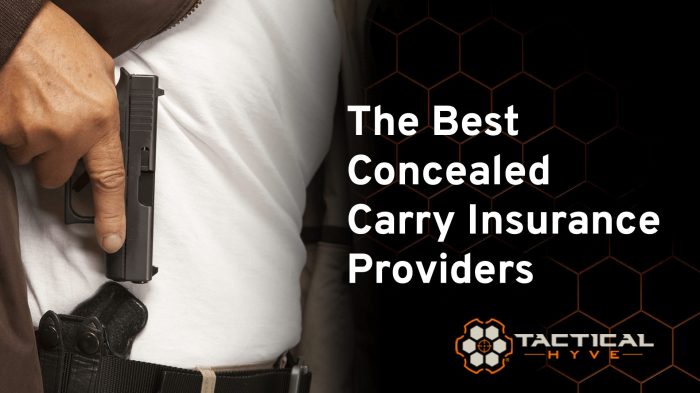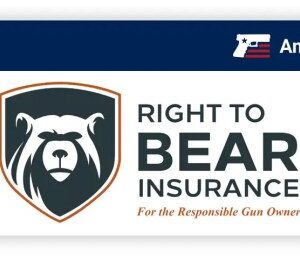Best concealed carry insurance Illinois? Navigating the Prairie State’s gun laws can feel like a Wild West showdown, but finding the right insurance doesn’t have to be a shootout. This isn’t your grandpappy’s liability coverage; we’re talking about protecting yourself – legally and financially – in a world where carrying a concealed weapon is a serious responsibility. We’ll unpack Illinois’ specific regulations, the different types of insurance available, and help you choose a policy that fits your needs and your budget, because responsible gun ownership means responsible insurance.
From understanding the nuances of Illinois’ concealed carry permits to comparing insurance providers and deciphering policy jargon, we’ll cut through the red tape and get you the information you need to make an informed decision. Whether you’re a seasoned firearms owner or just starting out, this guide will help you navigate the often-confusing world of concealed carry insurance in Illinois.
Illinois Concealed Carry Laws and Regulations
Navigating Illinois’ concealed carry laws requires careful attention to detail, as the regulations are complex and can significantly impact your need for supplemental insurance. Understanding these laws is crucial not only for legal compliance but also for personal safety and liability protection. This section will break down the key aspects of Illinois concealed carry laws, focusing on their implications for insurance coverage.
Permit Requirements and Restrictions
Obtaining a concealed carry license (CCL) in Illinois involves a multi-step process. Applicants must be at least 21 years old, a U.S. citizen or legal resident, and undergo a background check that includes fingerprinting. Illinois also mandates firearms training courses, covering safe handling, storage, and the legal use of firearms. Restrictions on where a concealed firearm can be carried are extensive, prohibiting possession in schools, government buildings, and other designated areas. Furthermore, specific restrictions apply to individuals with certain criminal histories or mental health adjudications. The application process itself can take several months, underscoring the need for proactive planning.
Comparison with Neighboring States
Illinois’ concealed carry laws differ significantly from those of its neighbors. For example, Indiana has a more permissive “shall-issue” system, meaning that applications are generally approved as long as the applicant meets the basic requirements. Meanwhile, states like Wisconsin and Iowa have their own specific requirements and restrictions, often differing in the type of training needed, waiting periods, and permitted locations for carrying concealed firearms. This variance highlights the importance of understanding the specific laws of each state when traveling with a firearm. Failing to comply with the laws of another state could have significant legal and financial repercussions.
Illinois Concealed Carry Law Summary Table
| Permit Type | Restrictions | Required Training |
|---|---|---|
| Illinois Concealed Carry License (CCL) | Prohibited in schools, government buildings, bars, and other restricted areas; restrictions based on criminal history and mental health status. | 16 hours of firearms training, including classroom and range time, covering safe handling, storage, and the legal use of firearms. |
Types of Concealed Carry Insurance in Illinois: Best Concealed Carry Insurance Illinois
Navigating the world of concealed carry in Illinois requires understanding not just the legal framework, but also the crucial role of insurance in protecting yourself from potential legal and financial ramifications. Several types of insurance policies cater specifically to the needs of Illinois concealed carry permit holders, offering varying degrees of coverage and cost. Choosing the right policy depends heavily on individual circumstances and risk tolerance.
Choosing the right concealed carry insurance in Illinois involves understanding the nuances of different policy types and their coverage. The market offers options focusing on self-defense situations, liability protection, and sometimes a combination of both. Premiums and deductibles vary significantly depending on the insurer, coverage level, and the applicant’s profile.
Self-Defense Insurance
Self-defense insurance policies are designed to cover legal fees and other expenses incurred if you’re involved in a self-defense shooting incident. This is arguably the most crucial type of insurance for concealed carry permit holders. These policies often cover costs associated with criminal defense, civil lawsuits, bail bonds, and even lost wages. The extent of coverage varies considerably; some policies might offer a limited amount of coverage, while others provide more comprehensive protection. It’s essential to carefully review the policy details to understand the specific inclusions and exclusions. For instance, some policies may exclude coverage if the shooting was deemed unjustified by a court of law.
Liability Insurance
Liability insurance, in the context of concealed carry, protects you against financial losses resulting from injuries or damages caused to others, even if the incident was unintentional. This is especially important if your firearm accidentally discharges, causing harm to someone. Liability insurance can cover medical expenses, property damage, and legal fees associated with a lawsuit. It’s a critical component of a comprehensive concealed carry insurance plan, offering a safety net beyond self-defense scenarios. Without liability insurance, you could face significant financial burden even if you were not at fault.
Combined Self-Defense and Liability Insurance
Many insurance providers offer combined policies that bundle self-defense and liability coverage into a single plan. This approach offers a comprehensive solution, covering both the legal and financial risks associated with carrying a concealed firearm. This is often the most cost-effective option, as purchasing separate policies can be more expensive. The specific coverage limits and exclusions will vary between providers, so comparing different policies is crucial before making a decision.
Premium and Deductible Comparisons
Premiums and deductibles for concealed carry insurance vary significantly based on the insurer, the level of coverage, and the individual’s risk profile. Factors like age, location, prior incidents, and the type of firearm carried can all influence the cost. Generally, policies with higher coverage limits and lower deductibles will command higher premiums. It’s advisable to obtain quotes from multiple insurers to compare costs and coverage options before making a decision. For example, one insurer might offer a $100,000 liability policy with a $500 deductible for $300 annually, while another might offer the same liability coverage with a $1,000 deductible for $250 annually.
Key Features and Benefits Summary
- Self-Defense Insurance: Covers legal fees, bail, lost wages related to a justified self-defense shooting.
- Liability Insurance: Protects against financial losses from injuries or damages caused to others, regardless of fault.
- Combined Policies: Offer both self-defense and liability coverage in a single, often more cost-effective plan.
Factors to Consider When Choosing Concealed Carry Insurance

Source: concealedcarrysociety.com
Choosing the right concealed carry insurance in Illinois requires careful consideration of several key factors. A seemingly small difference in policy details can significantly impact your financial protection in the event of a self-defense shooting. Understanding these factors will empower you to make an informed decision that best suits your needs and budget.
Coverage Limits and Types
The coverage limits of a concealed carry insurance policy directly determine the maximum amount the insurer will pay for covered incidents. This includes legal fees, bail bonds, and other expenses related to a self-defense shooting. Policies typically offer different tiers of coverage, ranging from basic to comprehensive. Higher coverage limits provide greater financial protection, but naturally come with a higher premium. It’s crucial to assess your personal risk tolerance and financial capacity when selecting a coverage level. For example, a policy with a $1 million limit offers significantly more protection than one with a $100,000 limit, particularly in cases involving substantial legal battles. Understanding the different types of coverage offered, such as self-defense coverage, criminal defense coverage, and civil liability coverage, is also essential for choosing the right policy.
Policy Exclusions and Limitations
Every concealed carry insurance policy contains exclusions – specific circumstances or situations where coverage may not apply. These exclusions can vary widely between insurers. Common exclusions might include incidents involving illegal activities, intoxication, or the use of a firearm outside of self-defense. Carefully reviewing the policy’s exclusions is crucial to avoid unpleasant surprises. For instance, a policy might exclude coverage if the firearm was illegally modified or if the insured was acting recklessly. Understanding these limitations is as important as understanding the coverage itself. A seemingly comprehensive policy might offer limited protection if key scenarios are excluded.
Policy Terms and Conditions
Thoroughly reading and understanding the policy’s terms and conditions is paramount. This includes the definition of “self-defense,” the process for filing a claim, and the insurer’s responsibilities. Don’t hesitate to contact the insurer directly to clarify any ambiguities or uncertainties. The terms and conditions Artikel the agreement between you and the insurer, and a clear understanding is essential to ensure you receive the protection you expect. Ignoring this crucial step could leave you vulnerable to unforeseen financial burdens in the event of a claim.
Cost and Affordability
The cost of concealed carry insurance varies depending on several factors, including coverage limits, the insurer, and the insured’s risk profile. While comprehensive coverage offers greater peace of mind, it typically comes at a higher price. Balancing cost with the desired level of protection is essential. Comparing quotes from multiple insurers is recommended to find the most affordable option that meets your needs. Many insurers offer different payment plans, such as monthly or annual installments, which can help manage the cost more effectively. Exploring various options and comparing features against price points is crucial for finding a balance between affordability and comprehensive protection.
Decision-Making Flowchart
To aid in your decision-making process, consider this flowchart:
1. Determine your budget: What can you realistically afford to pay annually for insurance?
2. Define your needs: What level of coverage (e.g., $100,000, $1 million) do you require?
3. Identify potential exclusions: Are there specific situations (e.g., use of force outside self-defense) that might be relevant to you?
4. Compare policies: Obtain quotes from multiple insurers, carefully reviewing terms and conditions.
5. Choose the best fit: Select the policy that offers the best balance of coverage, cost, and terms, given your specific circumstances.
Finding and Comparing Concealed Carry Insurance Providers in Illinois
Navigating the world of concealed carry insurance in Illinois can feel like venturing into a maze. Understanding the different providers, their offerings, and how to compare them is crucial for securing the right level of protection. This section will equip you with the knowledge and tools to confidently compare insurance options and find the best fit for your needs.
Choosing the right concealed carry insurance provider involves careful consideration of various factors, including coverage specifics, customer service reputation, and pricing. It’s not a one-size-fits-all situation; the ideal policy depends heavily on your individual circumstances and risk tolerance.
Reputable Concealed Carry Insurance Providers in Illinois, Best concealed carry insurance illinois
Several reputable companies offer concealed carry insurance in Illinois. It’s important to note that the availability and specific offerings of these providers can change, so always verify directly with the company. This list is not exhaustive, and the inclusion of a company does not constitute an endorsement.
Comparing Concealed Carry Insurance Services and Features
Direct comparison is key to finding the best value. Providers often offer varying levels of coverage, such as legal defense, bail bonds, and self-defense training reimbursements. Some policies might offer broader coverage for different scenarios, while others might focus on specific aspects of legal defense. Carefully review policy documents to understand the nuances of each provider’s offerings. Pay close attention to exclusions and limitations as well.
Obtaining Quotes from Multiple Providers
The process of obtaining quotes is generally straightforward. Most providers have online platforms where you can request a quote by providing basic information about yourself and your needs. It’s advisable to contact multiple providers directly – a phone call can sometimes reveal additional details or options not readily available online. Be prepared to answer questions about your experience with firearms, your training, and the type of firearm you carry. Keep detailed records of all quotes received for easy comparison.
Concealed Carry Insurance Provider Comparison Table
| Company Name | Coverage Options | Contact Information |
|---|---|---|
| USCCA (United States Concealed Carry Association) | Legal defense, bail bond, self-defense training reimbursement, and more. Specifics vary by plan. | Website: uscca.com (Check for contact details on their website) |
| CCW Safe | Legal defense, bail bond, and other related services. Coverage details vary by plan. | Website: ccwsafe.com (Check for contact details on their website) |
| Concealed Carry Insurance (CCI) | Legal defense, bail bond, and other coverage options. Check their website for details. | Website: concealedcarryinsurance.com (Check for contact details on their website) |
| [Insert another provider if known and verifiable] | [Describe coverage options] | [Website and/or phone number] |
Understanding the Claims Process for Concealed Carry Insurance

Source: gununiversity.com
Navigating the best concealed carry insurance in Illinois can be tricky, especially with the legal nuances involved. But smart gun owners often look for ways to bundle their coverage, and that’s where exploring options like USAA bundle insurance can come into play, potentially saving you money while ensuring comprehensive protection. Remember to thoroughly research all your options to find the best concealed carry insurance that fits your specific needs in Illinois.
Navigating the claims process for concealed carry insurance in Illinois can feel daunting, but understanding the steps involved can significantly ease the burden should you need to file a claim. This section details the process, required documentation, potential outcomes, and provides a step-by-step guide to help you through. Remember, prompt action and accurate documentation are key to a successful claim.
Filing a Concealed Carry Insurance Claim: Steps Involved
Filing a claim typically involves several key steps. The specific procedures might vary slightly depending on your insurance provider, so always refer to your policy documents for the most accurate and up-to-date information. However, the general process remains consistent across most providers.
- Initial Notification: Immediately contact your insurance provider to report the incident. This initial contact establishes a record of the event and initiates the claims process. Note the time and date of your initial contact.
- Claim Form Completion: You’ll likely need to complete a claim form provided by your insurer. This form will request detailed information about the incident, including dates, times, locations, and involved parties.
- Documentation Submission: Gather and submit all necessary supporting documentation (detailed below). The more comprehensive your documentation, the smoother the claims process will be.
- Investigation: The insurance company will conduct an investigation into the incident. This may involve reviewing police reports, witness statements, and other relevant evidence.
- Claim Review and Decision: Once the investigation is complete, the insurance company will review your claim and make a decision regarding coverage. This decision will be communicated to you in writing.
- Settlement or Denial: If your claim is approved, the insurance company will process the settlement according to your policy terms. If denied, you’ll receive a detailed explanation of the reasons for denial, and may have options for appeal.
Required Documentation for a Concealed Carry Insurance Claim
Providing comprehensive documentation is crucial for a successful claim. This documentation helps the insurance company verify the details of the incident and assess your eligibility for coverage. Failing to provide necessary documentation can lead to delays or claim denial.
- Police Report: A copy of the official police report filed in connection with the incident. This is typically a fundamental requirement.
- Witness Statements: Statements from any witnesses to the event, including contact information.
- Medical Records: If injuries occurred, provide copies of all relevant medical records, including doctor’s notes, hospital bills, and therapy records.
- Legal Documents: Copies of any legal documents related to the incident, such as court orders, summonses, or indictments.
- Photographs and Videos: Any photographs or videos that document the scene of the incident or the injuries sustained.
- Concealed Carry License: A copy of your valid Illinois Concealed Carry License.
Potential Claim Outcomes and Timeline
The outcome of a concealed carry insurance claim can vary widely depending on the specifics of the incident and the terms of your policy. Claims can be approved, partially approved, or denied. The timeline for resolution also varies, but generally ranges from a few weeks to several months, depending on the complexity of the case and the amount of documentation required.
For example, a straightforward claim involving minor property damage might be resolved quickly, while a claim involving serious injury or a complex legal battle could take considerably longer. In cases of denial, the insurer must provide a detailed explanation of the reasons for the denial, often including references to specific policy exclusions. Policyholders may have the right to appeal a denial, usually following a process Artikeld in the policy documents.
Legal Considerations and Self-Defense Laws in Illinois
Successfully navigating the legal landscape surrounding self-defense in Illinois requires a thorough understanding of the state’s laws and the potential ramifications of using a firearm. This knowledge is crucial for responsible gun owners, and concealed carry insurance can play a significant role in mitigating the financial and legal burdens that can arise from such situations.
Illinois is a “stand your ground” state, meaning individuals generally do not have a duty to retreat before using force in self-defense, provided they are lawfully in the place where the confrontation occurs. However, this right is not absolute and is subject to certain limitations and requirements. The use of force must be proportionate to the threat faced, and the individual must reasonably believe that such force is necessary to prevent imminent death or great bodily harm to themselves or another. This “reasonable belief” is a key element that will be scrutinized in any legal proceedings.
Stand Your Ground and Duty to Retreat in Illinois
Illinois’s “stand your ground” law, codified in relevant statutes, allows individuals to use deadly force in self-defense without attempting to retreat, provided they are not engaged in unlawful activity and the use of force is justified. This contrasts with states that have a “duty to retreat” requirement, where individuals must attempt to safely retreat before using deadly force, if possible. The key element is the reasonableness of the individual’s belief that deadly force was necessary. The absence of a duty to retreat does not grant license for aggression or excessive force. The law mandates a proportional response to the threat perceived.
The Role of Concealed Carry Insurance in Legal Proceedings
Concealed carry insurance can provide crucial support during legal proceedings following a self-defense incident. This support extends beyond simple financial assistance. It often includes legal defense coverage, which can cover attorney fees, expert witness fees, and other related legal costs. These costs can quickly escalate, placing a significant financial strain on individuals. Having insurance can help alleviate this burden and allow the individual to focus on the legal aspects of their case rather than the financial implications. Furthermore, some policies offer access to legal counsel specializing in self-defense cases, ensuring a robust defense strategy is implemented.
Examples of Beneficial Concealed Carry Insurance Applications
Consider a scenario where an individual lawfully carrying a concealed firearm is confronted by an armed attacker in a public place. They use their firearm in self-defense, resulting in the attacker’s injury. Even if the individual acted in accordance with the law, they could still face legal challenges, including civil lawsuits from the attacker or their family. Concealed carry insurance can cover the legal fees associated with defending against such a lawsuit. In another scenario, a homeowner uses their firearm to defend themselves and their family against a home invasion. Again, despite acting lawfully, the homeowner could face legal and financial repercussions. Concealed carry insurance would provide crucial financial and legal support to navigate this complex situation. The insurance coverage acts as a safeguard, helping to protect the individual’s assets and ensuring access to skilled legal representation.
Cost and Value of Concealed Carry Insurance
Concealed carry insurance in Illinois, like any insurance, involves a cost-benefit analysis. Weighing the relatively small annual premium against the potentially catastrophic financial burden of a self-defense incident is crucial for responsible gun owners. This section explores the financial aspects of concealed carry insurance, demonstrating its value in mitigating significant risks.
Calculating Potential Costs of a Self-Defense Incident
The financial fallout from a self-defense shooting, even if legally justified, can be staggering. Legal fees alone can easily reach tens of thousands of dollars, covering attorney consultations, court appearances, discovery processes, and potential appeals. Beyond legal costs, consider medical expenses for both yourself and the other party (even if injuries are inflicted in self-defense, you may face civil suits), property damage, lost wages due to time off work for legal proceedings, and the cost of bail. Let’s illustrate: Imagine a scenario where you’re forced to use your firearm in self-defense, resulting in injuries to the attacker. Your legal representation could cost $20,000-$50,000, medical bills for the attacker could exceed $10,000, and your own legal defense costs, lost wages, and potential civil suit settlements could easily add another $20,000. This totals a potential exposure of $50,000 – $80,000 or more.
Comparing Insurance Costs to Potential Financial Risks
A typical annual premium for concealed carry insurance in Illinois might range from $100 to $500, depending on the coverage level and the insurer. This seemingly small annual investment pales in comparison to the potential six-figure expenses detailed above. Even a single incident without insurance could wipe out life savings. The cost of not having insurance is the risk of bearing the full financial weight of a self-defense situation, a risk far exceeding the cost of a yearly premium.
Peace of Mind Provided by Concealed Carry Insurance
Beyond the purely financial aspects, concealed carry insurance offers invaluable peace of mind. Knowing you have a safety net in place can reduce the stress and anxiety associated with carrying a firearm. This peace of mind allows you to focus on responsible gun ownership and self-defense training, rather than constantly worrying about the potential financial consequences of a self-defense incident. The psychological benefit of knowing you’re protected cannot be underestimated.
Hypothetical Scenario Illustrating Insurance Value
Consider Sarah, a responsible Illinois concealed carry permit holder. She purchased a concealed carry insurance policy for $200 annually. During a late-night encounter, she was forced to use her firearm in self-defense. While legally justified, the incident resulted in injuries to the attacker. Without insurance, Sarah faced potential legal fees exceeding $40,000 and substantial medical bills. However, her insurance covered her legal defense, significantly reducing her out-of-pocket expenses and providing her with crucial legal representation. The $200 premium was a small price to pay for the peace of mind and substantial financial protection she received. The alternative – facing potential financial ruin – would have been far more costly.
Final Review

Source: tacticalhyve.com
So, you’ve got your permit, your firearm, and now – the peace of mind that comes with the right concealed carry insurance in Illinois. Remember, responsible gun ownership isn’t just about knowing the laws; it’s about protecting yourself from the unexpected. By understanding your options, comparing providers, and choosing a policy that fits your specific needs, you can confidently navigate the complexities of concealed carry in the Land of Lincoln. Now go forth and stay safe, responsibly armed and insured.



